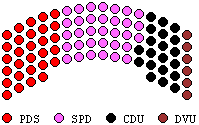Politics of Brandenburg
The Politics of Brandenburg takes place within a framework of a federal parliamentary representative democratic republic, where the Federal Government of Germany exercises sovereign rights with certain powers reserved to the states of Germany including Brandenburg. The three main parties are the centre leftist Social Democratic Party of Germany (SPD), the leftist Left Party and the centre rightist Christian Democratic Union.
Every five years, all Germans residing in the State over the age of 18 elect the members of the Landtag of Brandenburg. This regional parliament or legislature then elects the Minister-President and confirms the cabinet members.
List of minister presidents of Brandenburg

Dietmar Woidke
- For earlier rulers, see List of rulers of Brandenburg
- 1947 - 1949: Karl Steinhoff (SED, formerly SPD)
- 1949 - 1952: Rudolf Jahn (SED)
- 1990 - 2002: Manfred Stolpe (SPD)
- 2002 - 2013: Matthias Platzeck (SPD)
- 2013: Dietmar Woidke (SPD)
September, 2004 State Election

seat results - September 19, 2004
- See also Elections in Germany
| party | 1999 | 2004 | Difference | |||
|---|---|---|---|---|---|---|
| % | S | % | S | % | S | |
| Social Democratic Party of Germany (SPD) | 39.3 | 37 | 31.9 | 33 | -7.4 | -4 |
| The Left Party (Die Linke.) | 23.3 | 22 | 28.0 | 29 | +4.7 | +7 |
| Christian Democratic Union (CDU) | 26.6 | 25 | 19.4 | 20 | -7.2 | -5 |
| German People's Union (DVU) | 5.3 | 5 | 6.1 | 6 | +0.8 | +1 |
| all others | 5.5 | 0 | 14.6 | 0 | +9.1 | ±0 |
This article is issued from
Wikipedia.
The text is licensed under Creative Commons - Attribution - Sharealike.
Additional terms may apply for the media files.